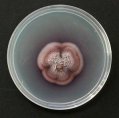Cool Science Experiments
Microbes
 The dependence on hydrocarbon fuels supports a large infrastructure and distribution network. So scientists are looking for new sources of petroleum using bugs - tiny microbes that are genetically engineered to excrete bio-fuels.
The dependence on hydrocarbon fuels supports a large infrastructure and distribution network. So scientists are looking for new sources of petroleum using bugs - tiny microbes that are genetically engineered to excrete bio-fuels.
Sugar cane, is fed to E.coli to produce bio-diesel fuel. The microbes metabolize the material and excrete fatty acids that are the same as petroleum.
In fact, the properties are no different from those of gasoline, diesel or jet fuel and genetic control can create the appropriate petroleum product.
The problem with alternative fuels like ethanol, according to University of Minnesota economist Jason Hill, is it can't be transported through current pipelines and even if all the corn grown in the United States was used for producing ethanol - it would only represent 12 percent of consumption.
Alternatively, a sugar cane crop could be converted to hydrocarbon fuel using microbes. The new crop would then absorb the resulting carbon emissions created by the fuel. This would create a hypothetical carbon-neutral gasoline.
Bio-fuel companies are securing sugar cane production from plantations in the United States and abroad in anticipation of creating these new petroleum products.
 But scientists may have found a better solution for producing bio-fuel in the rainforests of South America.
But scientists may have found a better solution for producing bio-fuel in the rainforests of South America.
A fungus known as "gliocladium roseum" produces bio-fuel from cellulose waste like sawdust and woodchips.
According to researcher Gary Strobel of Montana University, the fungus is more efficient and is a better source of bio-fuel than anything currently available, particularly since it could be used to consume 400 million tons of plant waste produced every year from farmland. More Cool Science Experiments.
Sources: www.ls9.com www.amyrisbiotech.com www.plantsciences.montana.edu



